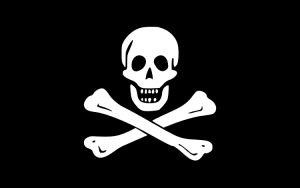To keep Patheos’ lawyers happy, let me begin by saying I am not advocating breaking any laws and I am in no way advocating violence. Law-breaking is rarely necessary and is frequently counterproductive. If you feel called to non-violent civil disobedience to protest injustice by all means do so, but that’s not what this post is about.
I am, however, advocating breaking a hell of a lot of rules.
Pirates have a unique place in American culture. Part noble outlaws, part counterculture individualists, and part proto social democrats, their exploits have been chronicled and romanticized at least since the publication of Treasure Island in 1883. Today Pirates, Buccaneers and Raiders are professional sports teams, Treasure Island is a hotel in Las Vegas, Long John Silver sells fast food fish, the Pirates of the Caribbean is both an amusement park ride and a successful series of movies, and September 19 is Talk Like a Pirate Day.
Reality, of course, is never quite so romantic. Some pirates and privateers were pawns in European wars of empire and some were desperate men (and a few desperate women) doing desperate things. Their progressive social insurance for lost body parts only highlights the fact that piracy was dangerous work. And for every pirate who retired rich, many more were killed or lost at sea, or hanged by an unfriendly government. Our society’s love of pirates doesn’t extend to the contemporary Somali pirates – if they had a decent publicity agent they’d start wearing tricorn hats and flying the Jolly Roger.
Real piracy continues in the 21st century because desperate men still do desperate things. Romantic piracy continues because we still see the need for noble outlaws and because the freedom of the open sea is still alluring. The fact that we cannot steal a ship, enlist a crew and plunder the Spanish Main – nor would we if we could… well, most of us, anyway – does not mean piracy is no longer possible. Piracy is quite possible, and I’d say it’s downright necessary.
“You didn’t beat me. You ignored the rules of engagement. In a fair fight, I’d kill you.”
“That’s not much incentive for me to fight fair, then, is it?” – Will Turner and Jack Sparrow, Pirates of the Caribbean: The Curse of the Black Pearl
Piracy is extracting wealth from a corrupt system. Pirates are noble outlaws, not common thugs or politicians – this isn’t stealing, or sabotage, or a job where you sit in a cubicle and play on Facebook all day. This is working within the system to support yourself and your family without buying into the twisted values of the system. This is doing your job fairly and honorably and then going home to work in your garden, make offerings to your gods, study witchcraft, or write blog posts advocating piracy. This is taking pleasure in the knowledge that a major multinational corporation is supporting counterculture values and esoteric studies.
I think I’ve linked to Gordon White’s post There Is The Rescue Mission And The Salvage Mission three times now. If you haven’t read it yet, go read it now. Gordon makes a similar argument, but does so far more eloquently and with brilliant historical examples. The post title comes from its last line: “Your time here on earth is a rescue mission. Which you fund with a salvage mission.”
Or, you do what you have to do so you can do what you’re called to do.
Piracy is setting your own course. It’s easy to walk through the garage at work and start feeling like I need a BMW or a Mercedes, or to sit in a meeting and feel like I should be wearing $90 shirts and $500 shoes… and that if I’d just work a little harder and a little longer, if I was just a little more committed to my job, I could. The advertising world works very hard to tell us we can’t be happy – that we don’t deserve to be happy – unless we buy what they’re selling.
Regular spiritual practice keeps me connected to my core values and keeps me committed to my calling. It reminds me that my true identity is a Druid and a priest… and maybe, a pirate.
Piracy is living by the code and supporting your fellow pirates. The Pirate’s Code is legendary. In reality, each ship had its own articles of agreement which specified rules of conduct and how spoils would be distributed. Punishments for rule violations could be severe, as was common for the time, but they were designed to keep order among outlaws in stressful situations. Only by putting their common goals ahead of their self interest did they stand a chance against the bigger, better financed imperial navies.
One of the things the UU world does well is covenants – agreements among congregations, boards, committees and other small groups that spell out how they will work together to accomplish their goals in an atmosphere of mutual respect. Covenants work best when they’re short, basic, and developed through consensus rather than handed down by an authority.
The programs and infrastructures we have counted on for the past 50 years or more will continue to do less and less as the rich and powerful insure their take from a shrinking pie is maintained. As we continue down the Long Descent, the need to look out for each other is only going to grow. Groups that form around the bond of common religion are likely be more successful, and the likelihood of that success will grow if all members agree to a covenant of supportive behavior and mutual assistance.
Notice I did not say a covenant of orthodox beliefs and required practices. I said conduct yourselves like good pirates and keep the ship in order and the crew healthy.
Piracy is playing the game intelligently and exploiting the rules to your advantage. The rules of our mainstream society were developed for the benefit of those with money and power. If we are excluded from the decision making process and denied a fair share of the benefits of the system, we should not feel constrained by the rules of the system.
On the other hand, with a little imagination it’s frequently possible to pull off small but significant wins playing the mainstream games. Tax credits and exemptions, employer-paid tuition, and dual-purpose training are just some of the above-board tricks available in certain situations. Just make sure what you’re getting is really a win – don’t drop a $20 (or $200) in the casino to get a “free” beer.
“The only rules that really matter are these: what a man can do and what a man can’t do.” – Jack Sparrow, Pirates of the Caribbean: The Curse of the Black Pearl
I’ve seen some people complain that playing the system well is still supporting an unjust system. I want to change the world as much as the next well-meaning person, but I also understand systems change very slowly. Where there’s an opportunity to make a change, push the change. Where there isn’t, be a pirate and play the game well. A successful pirate will help the cause more than any dead martyr.
If my 12-year-old self could see me writing this, he’d be sad, and probably angry. I wanted to find success by playing the game by the rules and by playing it better than anyone else. It never occurred to me that working hard wouldn’t be enough. It never occurred to me that the rules would be changed over and over again. And it really never occurred to me that so many would support maintaining wealth and power for a few over providing enough for all, or that the needs of future generations would be ignored for convenience here and now.
I knew that as a straight, white, man I had certain advantages. I knew that as the child of blue collar Southerners I had certain disadvantages. Mainly I assumed my intelligence and work ethic would be my ticket to the top.
It never occurred to me that the price of entry was my soul.
I’m a Druid and I will conduct myself honorably. But my paying work is not my career, it’s a salvage mission to fund the rescue mission. I will chart my own course. I will support my community. And I will play the game as well as I can… without giving up my soul.
“Not just the Spanish Main, love. The entire ocean. The entire world. Wherever we want to go, we’ll go. That’s what a ship is, you know. It’s not just a keel and a hull and a deck and sails, that’s what a ship needs but what a ship is… what the Black Pearl really is… is freedom.” – Jack Sparrow, Pirates of the Caribbean: The Curse of the Black Pearl














